-
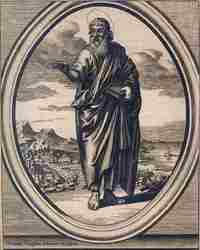 Brother Polycarp — named for St Polycarp (A.D. 69-155), martyr and father of the Church. This is his "religious name", that is the name he chose upon taking religious vows.
Brother Polycarp — named for St Polycarp (A.D. 69-155), martyr and father of the Church. This is his "religious name", that is the name he chose upon taking religious vows. - Kuhlau — Friedrich Kuhlau (1786-1832), Danish composer, known during his lifetime as "the Beethoven of the flute". Briccialdi — Giulio Briccialdo (1818-1881), Italian flautist and composer.
- transverse mode — side-blown, as opposed to end-blown like a whistle or recorder.
- Phil the Fluter — from "Phil the Fluther's Ball", popular comedy song by Percy French. ♫♫
- maulers — (("the hands" – EDD.))
- cod — (("a joke; a hoax, leg-pull" – OED.))
- St Cecilia — patron saint of music. Wikipedia.
- cut a dash — make a display. ((OED.))
- sugar-sack — (("a bag made of fine sacking for containing sugar; the sacking itself" – OED.)) The sacking was prized as material for home-made underwear and the like.
- chaffing — ridicule, banter. ((OED.))
- randled — ? rhymed. ((randle: "a set of nonsense verses, repeated in Ireland by schoolboys and young people, who have been guilty of breaking wind backwards" – Partridge HS.)) I think I think I smell a stink ... — traditional children's rhyme. ((Johnston, Around the Banks of Pimlico, 1985.))
- cheeser — (("a strong-smelling fart" – Partridge HS.))
- gabh mo leithscéal — Irish, literally "accept my excuse" (roughly pronounced "gawve muh leshkale")
- gouger — (("a cheat, ruffian" – DILR.))
- school commons — ? the school common room, a recreational space.
- fly-paper — apparently involving a pun on Jim's gaping mouth ((fly-catcher: "an open-mouthed ignoramus" – Farmer 1904)) and ((fly-paper: "a sheet of paper prepared to catch or poison flies" – OED.))
- suck — sycophant. (("esp. a schoolboy who curries favour with teachers" – OED.))
- vilipendence — ((vilipendency: "the expression of disparagement or contempt" obsolete, rare – OED.)) "Vilipendence" does not appear in any English dictionaries on the web. Br Polycarp (who has chosen Polycarp for his name in religion) has a penchant for unusual words: vilipendence, longanimity. If in nothing else, Jim is his pupil here.
- Erse — usually applied to Scottish Gaelic. When applied, as here, to Irish Gaelic, it carries a derogatory note, sounding "genteel", Anglified, patronizing. …
The bold Sean O'Casey (Protestant, Irish speaker) approaches St Patrick's Cathedral (Protestant, in Dublin) to request a service in Irish: "After the Dean had recovered out of a bud swoon by swallowing a big dollop of warmed whiskey, he asked, Is there anything else you'd like? of the deputation that went to see him. Then he burst out laughing, shook his hide, and frowned with kind malignity, saying, Erse? What! have a service in Erse, and in St. Patrick's? Not in Erse, surely? Yes? No, no, gentlemen, it can't be did. It couldn't happen here. We don't want our church to be filled with Conn the Shaughrauns, like a Wicklow wedding" – O'Casey 3cf Wikipedia: Irish Language.
-

- chees and chaws — (("the Italianate pronunciation of ecclesiastical Latin" ca.1850-1900 – Partridge HS.)) For instance "Cicero", the famous Roman: in SE the name is pronounced "Sissero"; in university Latin (what Polycarp would seem to have learnt): "Kickero"; in continental Latin: "Cheetcherro". What Polycarp seems to bemoan is that the continental Latin is overtaking the university Latin in the Irish church. Nothing to be found on the web backs up this worry, beyond the Partridge entry above; and the Partridge entry refers almost certainly and solely to High Anglicanism.
- howsoever — however. ((archaic – OED.))
- ars musica — punning Latin "musical art" with "arse".
- St Augustine — St Augustine of Hippo (A.D. 354-430), church father, Doctor of the Church.
- break wind backwards — from St Augustine, City of God, 14.24 – "Some have such command of their bowels, that they can break wind continuously at pleasure, so as to produce the effect of singing." …
 On this subject, Wikipedia as always is enlightening:
On this subject, Wikipedia as always is enlightening:
"The professional farters of medieval Ireland were called braigetori. They are listed together with other performers and musicians in the 12th century Tech Midchúarda, a diagram of the banqueting hall of Tara. As entertainers, these braigetori ranked at the lower end of a scale headed by bards, fili and harpers." – Wikipedia: Flatulist. - supererogation — (("performance of more than duty or circumstances require" – OED.))
-
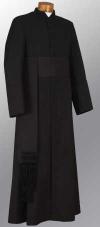 soutane — (("a long close-fitting garment, covering the body from the neck to the ankles. It is fastened in the front from the top to the bottom by means of buttons. A small aperture is made in the neck-band in order to expose the collar" – New Catholic Dictionary 1910.))
soutane — (("a long close-fitting garment, covering the body from the neck to the ankles. It is fastened in the front from the top to the bottom by means of buttons. A small aperture is made in the neck-band in order to expose the collar" – New Catholic Dictionary 1910.)) -
 Macassar — ((Macassar oil: "an unguent for the hair, grandiloquently advertised in the early part of the 19th century, and represented by the makers (Rowland and Son) to consist of ingredients obtained from Macassar" – OED.))
Macassar — ((Macassar oil: "an unguent for the hair, grandiloquently advertised in the early part of the 19th century, and represented by the makers (Rowland and Son) to consist of ingredients obtained from Macassar" – OED.)) - stumbling feet — feet here in the prosody sense, i.e. a division of verse or its underlying rhythm.
- embraced their arms ... — from Virgil, Aeneid, II:253: sopor fessos complectitur artus – "sleep enfolds their weary limbs" – A.S. Kline translation.
- school dick — the school dictionary. ((Partridge HS.))
-
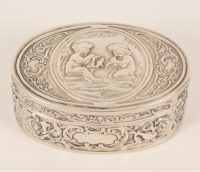 snuff-box — (("a box for holding snuff, usually small enough to be carried in the pocket" – OED.))
snuff-box — (("a box for holding snuff, usually small enough to be carried in the pocket" – OED.)) -
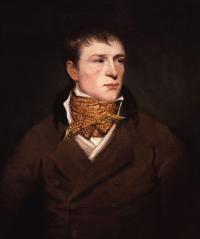 belcher — handkerchief. (("loosely, a handkerchief of any base with spots of another colour" colloquial, and from ca. 1875 Standard English "Ex the boxer Jim Belcher (d. 1811)" – Partridge HS.))
belcher — handkerchief. (("loosely, a handkerchief of any base with spots of another colour" colloquial, and from ca. 1875 Standard English "Ex the boxer Jim Belcher (d. 1811)" – Partridge HS.)) - A Nation Once Again — popular Irish "rebel" song, for long an unofficial nationalist anthem. Nation Once Again
- white as nip — (("very white, very clean" – EDD.))
- con brio — (("spiritedly" – Oxford Music.))
- rapparee — (("an Irish robber or outlaw; whence a vagabond" – Farmer 1904.)) (("an Irish pikeman or irregular soldier, of the kind prominent during the war of 1688-92" – OED.)) fifers — indicative of militancy over musicianship. ((fifes "used chiefly to accompany the drum in military music" – OED.))
- mountain-men — people from the mountains, i.e. uncouth, wild, patriotic. Usually mountainy (("... he's one of those mountainy men that live up in the hill behind Aussolas. Oweneen the Sprat is the name he goes by, and he's the crossest little thief in the Barony" – Somerville & Ross, Further Experiences of an Irish R.M., 1908.)) musicianer — musician. ((now rare in educated use – OED.))
- slips and slides — musical embellishments (? with perhaps the further sense of "moral failures")
- vincet amor patriae ... — Virgil, Aeneid, VI:823: "love of country will prevail, and great appetite for glory" – A.S. Kline translation.
- God Save the King — for possible Irish roots, see J. A. Fuller-Maitland, "Some Theories about 'God Save the King'", Proceedings of the Musical Association, 43rd Session (1916-1917), pp. 123-138.
- pandy — (("a stroke upon the extended palm with a leather strap ... given as a punishment to schoolboys" – OED.))
- for speaking Erse — 19th century schools in Ireland encouraged the adoption of English by punishing children who spoke in Irish. …
"A state system of primary education was introduced in 1831 and one of its main aims was the teaching of English. Children were strongly discouraged from speaking Irish. "The 'tally stick', or bata scoir in Irish, was introduced into classrooms. Children attending school had to wear a stick on a piece of string around their necks. Each time they used Irish, a notch was cut into the stick. At the end of the day, they would be punished according to how many notches they had on their stick." — Irish Language in the 19th Century.
- O tempora, O mores — Latin, "Oh the times! Oh the manners!" (("an exclamation at the evil of them" – Collins.)) From Cicero's First Oration against Catiline.
- spindrift — (("spray blown up from the surface of the sea" – Collins.))
- vocation — (("divine influence or guidance towards a definite (esp. religious) career" – OED.))
-
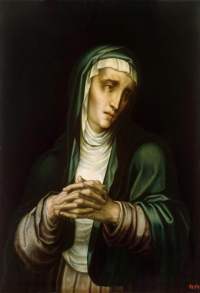
- parlous — (("perilous, dangerous" – OED.))
- Mater misericordiae ... — traditional Latin epithets for, and addresses to, the Virgin Mary. (Mother of mercy, sorrowful mother, our advocate, O gentle, O tender, O sweet Virgin Mary: pray for me!)
- Our Lady of Presentation — the particular manifestation of the Virgin Mary, as sponsor of the Presentation.
- longanimity — (("forbearance or patience" now rare; formerly common in religious use – OED.))
- Ever glorious and blessed Mary ... — from the "Thirty Day Prayer", a Catholic devotion. ^
- tinct — (("coloured, tinted; dyed, tinged; imbued" poetical – OED.))

| UK | US-h | US-p | |
|---|---|---|---|
| Pages | 59-65 | 58-63 | 49-54 |
| POV | Jim | ||
| Where | Flute band practice, Presentation College | ||
| When | Friday evening, May 7 1915 | ||